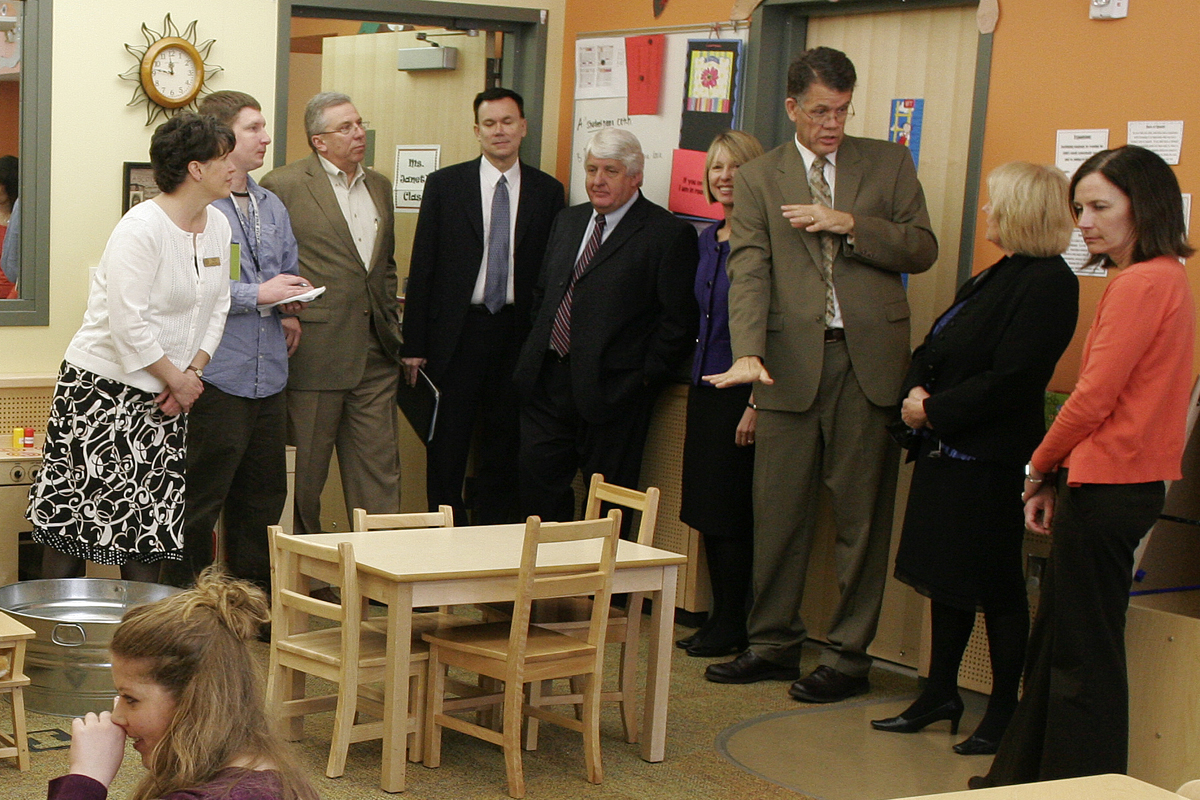Congressman Bishop visits campus to experience deaf learning program
U.S. Congressman Rob Bishop visited USU’s recently-constructed Emma Eccles Jones Early Childhood Education and Research Center on Monday to learn about its highly unique Sound Beginnings deaf education program.
USU Provost Raymond Coward said he was glad to have the opportunity to show Bishop a program that USU administrators are so proud of. Bishop has served for 16 years in the Utah Legislature as well as 30 years in public education.
“It’s fitting that we’re visiting an early education program that is literally changing the lives of the participant children and their families,” Coward said.
Utah Sen. Lyle Hillyard, Utah Rep. Jack Draxler, Tami Pyfer of the Utah Board of Education and Peggy Milligan from the Utah State Office of Education were also in attendance to hear about the fledgling program.
Coward said the graduate emphasis program attracts students from all over because of how cutting-edge the technology and research are.
“These are young people that are being provided a service that is unique to our state, which is unique to our nation, which is unique to this world,” Coward said. “Yet at the same time what you’ll be observing is a very active research program which has brought in much more than $1 million in external funding.”
Karl White, director of the National Center for Hearing Assessment and Management (NCHAM) and USU psychology professor, presented the high-profile group with the vitals of Sound Beginnings and led the group on a tour of the facilities.
“It’s truly state-of-the-art, it’s amazing,” Bishop said. “It’s one of the few that does this type of sound listening projects in the nation. It’s great that they have been able to make the kinds of scientific improvements over the years so these kids can truly reach the kind of potential that’s within them.”
White said Sound Beginnings provides teaching, care and assessment facilities for children. He said it is important to identify any hearing loss early with universal newborn hearing screening.
Sound Beginnings director Kristina Blaiser said their program offers early education for children from birth to six years of age. Listening and spoken language is the primary mode of communication the children learn.
The pediatric audiology clinic, which is part of Sound Beginnings, also serves community members from birth to age 22, said clinic coordinator Karen Munoz. The service provides hearing testing, hearing aids and cochlear implant mapping.
“Most people don’t know about congenital hearing loss – children who are born deaf,” White said. “They’re surprised to learn that it’s the most frequent birth defect in the United States, 95 percent of deaf babies are born to two hearing parents.”
He said congenital hearing loss is often referred to as an invisible disability, because until a deaf child reaches about 12 months of age usually behaves the same way a hearing child does.
When Sound Beginnings was opened in 2007, there were only nine students, White said. Now the facility provides speech and communication skills teaching to 30 kids, while also giving graduate students valuable interdisciplinary, hands-on experience.
“When I was teaching I never had a hearing-impaired in my classroom,” Bishop said, “so it was unique to try and visualize how these kids will be in another 10 years or so.”
Amie Dunkley, the mother of a Sound Beginnings student named Matthew, said she immediately began to see improvements and she said she was excited to see how familiar staff at Sound Beginnings seemed to be with her son’s condition.
She said now Matthew wants to learn, he asks questions and she is incredibly thankful that the program is right here in Cache Valley.
“As a parent, I think we want our kids to be as normal as they can be, and you want them to be in the public schools,” Dunkley said. “He needed more specific help to what his specific problem was. So I decided to put him in the program last summer.”
Sound Beginnings got off the ground largely by using state grants and does not rely on discretionary federal funding. The Emma Eccles Jones Foundation funded the building, Coward Said, and most of the tuition and stipend money for graduate students comes from federal funding.
Bishop said it is good that the state has a better track record than the federal government when it comes to balancing the budget.
There are only a few listening and spoken language schools in the country, White said. Sound Beginnings is highly unique and breaking new ground every day. Most schools for the deaf traditionally teach American Sign Language.
– dan.whitney.smith@aggiemail.usu.edu

